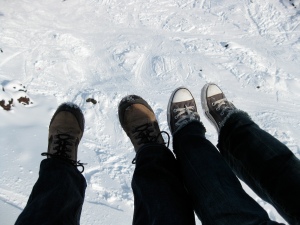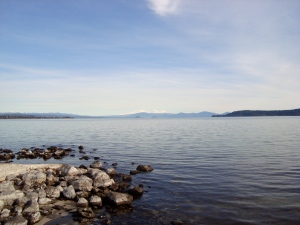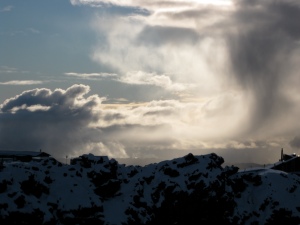Motorway 1, North Island, New Zealand

Hitching a Ride to the Top of Whakapapa
I was leaving for Auckland in less than three weeks, yet no one knew of my plans. Even though I was committed to and eager for the move, I was avoiding accepting the consequences of my decision. I could only predict the reactions of my flatmates, who were convinced that I was staying “indefinitely” (or at least longer than a month); my manager at the bookstore, who would no doubt tell me “I’m not angry, I’m just disappointed”; and my friends, who would be left heartbroken to confront their abandonment issues. I considered penning a few witty but apologetic post-it notes. Eventually, I summoned the courage to break the news face-to-face.
As usual, it was not nearly as awful or dramatic as anticipated. (I swear my imagination could twist a full-body massage into a life threatening experience.) One flatmate secured me an interview at a recruitment agency (the others posted an ad online for my replacement), while my manager offered to contact the various Auckland branches on my behalf. That just left my friends.
Over drinks with three former roommates from the hostel, I blurted out, “I’m leaving Wellington.”
“Wait. What? Really? Cool!” Somehow I had forgotten that they are all fellow expats, accustomed to losing friends to travel and unselfishly enabling of wanderlust.
“I’m moving to Auckland,” I continued with renewed confidence.
“Oh. We’re not angry, we’re just disappointed.”
Why do we unabashedly and greedily steal each other’s enthusiasm, like bullies stealing lunch money in the schoolyard? For the record, when someone tells you they are so unhappy that they have decided to relocate to a different city, “Ew, why would you want to move there?” is not an appropriate or appreciated response. Allow me to propose an exercise: the next time someone shares with you their hopes and dreams, regardless of how unappetizing or unrealistic they may seem to you, try to be encouraging. If you don’t have anything nice to say, be vague. My two favorite pleasantries are “I hope that works out for you” and “Let me know how that goes.” But I digress.
When I announced my departure date, Kate, my closest friend in Wellington, unexpectedly exclaimed, “Me too!” Unhappy in her receptionist job and due to start WWOOFing in the Coromandel at the end of the month, she had decided to quit work early in favor of exploring the North Island.
“I have an idea,” I shouted spontaneously, “let’s do a road trip!”
“Wicked! Except I don’t have a driver’s license.”
“That’s okay, I do!” And just like that, I had agreed to drive us from Wellington to Auckland, on the left side of the road.
I learned to drive at the tender age of fourteen and nine months in an automatic sedan in a small town in Michigan. Other than driving to school with my head out of the window in the winter, I’m not particularly skilled at operating motor vehicles. Only once have I been behind the wheel of a manual transmission, and that was in the parking lot of the Veuve Clicquot champagne house during a day trip to Reims, France with my parents.
Given the dearth of automatic cars abroad, I’ve always been wary of not knowing how to drive a stick shift. In Argentina, I even toyed with the idea of taking lessons. However, the chances of me wanting or needing to drive were so slim it hardly seemed worth it. New Zealand is a different story.
With a total land area of 268,680 sq km, New Zealand is similar in size to Japan. But Japan has an estimated population of 127 million people; New Zealand 4.2 million, and over 80% of that tiny population resides in cities. In other words, nearly everywhere in New Zealand lies off the beaten path. Sadly, public transportation in New Zealand is either inadequate or inexistent. Buses, both within and between cities, are expensive, infrequent and their routes are limited to only the most urban destinations.
Those brave enough or on a tight enough budget may try their hand (or thumb) at hitchhiking. New Zealand remains a relatively safe place to rely on the kindness of strangers, though not entirely devoid of crazies (just ask my Chinese-American friend who was picked up by a war veteran who spent the next two hours telling her, to paraphrase a line from Kill Bill: Vol 2, how much he hates Asians, despises Americans, and has nothing but contempt for women). Nevertheless, the best method of exploring the country is by car. But I couldn’t possibly drive in New Zealand – Kiwis drive on the opposite side of the road.
As it so happens, I could drive in New Zealand, at least legally if not very well. All that’s required to take to the road is a valid driver’s license from your home country. I find this curious, as I question the prudence of allowing me to drive in say, Los Angeles without further instruction, let alone in reverse. Nevertheless, I was hardly going to pass up a road trip and the chance to decompress before starting over in Auckland over something as silly as mono-motor-vehicle-dexterity. Since Kate is British, I figured that she would instinctively shout out before allowing me to turn into oncoming traffic or sideswipe a parked car. Besides, for just an extra $10/day, we could reduce our insurance liability to zero.
At the rental agency, we filled out paperwork for a Nissan Sunny. Keys in hand, I opened the front door, and immediately began rummaging through the glove compartment. “Just looking for a map,” I offered with a lighthearted smile.
“Aren’t you still holding the one I gave you earlier?” asked the rental agent.
“Oh, so I am.” Nothing inspires confidence like a driver who can’t find the steering wheel.
Surprisingly, the biggest challenge turned out not to be driving on the left side of the road, but sitting on the right side of the car. With a little practice, I soon became accustomed to both. Correctly using the turn signal, especially in a roundabout, still eludes me.

Lake Taupo
Since we had given ourselves less than a week, we were only going to two places: Mt Ruapehu – a popular destination for winter sports enthusiasts, and Taupo – a tiny town on the edge of the incomprehensibly enormous and enviably photogenic Lake Taupo.
Frankly, I am not enthusiastic about winter, but I wanted to cross “learn to snowboard” off my to-do list. Other than the fact that the car radio turned out to be a diehard fan of Christian rock music (further evidence that rural New Zealand is identical to rural America), it was an easy four-hour drive to the mountain through scenic landscape and small towns with names like Bulls (incredi-bull!) and information centers shaped like a dogs.
Eventually, we reached Ohakune, a quaint village 20 minutes from the Turoa ski area. Ohakune is also the carrot capital of New Zealand and the host of the annual carrot festival in July. And yes, there is a giant carrot stationed at the town’s entrance.
We checked into the hostel, which was owned and operated by two brothers who had clearly missed their calling as video store clerks. When I asked the younger of the two to please lock my laptop in the safe, he stared at me like I had just demanded the cube root of 81. I repeated the question, this time pointing at the computer. “Oh, man, I totally thought you wanted me to put that in the safe,” he said, nodding towards my pink Nalgene water bottle.
In the lounge, Kate and I discovered a lit fireplace and not one, but three Frenchmen sitting beside it: Henri, Victor, and Philippe, a dead ringer for Asterix’s sidekick Obelix. In Wellington, my friend had been casually dating Henri, another long-termer at the hostel. He was leaving for Australia in two days, but had dragged his friends to the mountain for one last run and one last good-bye. How romantic, I’m sure.
As neither my friend nor I had any snowboarding experience, I suggested we start the following day with a course. She suggested that we start our day messing about with the French guys on the bunny slope. Who was I to argue the injustice of majority rule with citizens of the birthplace of modern democracy?
The following morning, we arrived at Turoa and waited in an interminable line to rent snow pants, boots, boards, and wrist guards, but not gloves. Those you have to buy for an additional $20. When we finally waddled over to the beginner’s area, I dropped my board onto the snow and it immediately sped away like a rogue shopping cart in a supermarket parking lot. Luckily, I managed to wrangle it before it bulldozed a pair of instructors. If I couldn’t even set my board down properly, there was no way I could go down the mountain on top of it.
Suddenly, I remembered that a charming Kiwi bloke from the hostel had offered to teach me to snowboard, free of charge. More out of boredom than anything else, I sent him a text message, but he was already on his way back to town. Tired of waiting, I strapped on the board, and with a little help from Victor, coasted to the bottom without falling on my face or maiming a small child. Just like that, I was hooked.
I fared far worse without my French training wheels. Your coccyx may not serve any functional purpose, but it still hurts like hell when you land on it. In a moment of desperation, I fashioned a makeshift buttpad by shoving my hat down the back of my pants. Of course, this did little more than transform me into an extra from a rap music video and give me the courage to keep going.
The next day, I left Kate to eat carrot cake in a café while I snowboarded. After lunch, we loaded the car and began the drive to Taupo. On the way, Kate and I made a pit stop at Whakapapa (pronounced, to the amusement of my adolescent sensibilities, Fa-ka-pa-pa), the ski field on the other side of mountain where Kate’s friend worked in the repair shop.
Interestingly, while Kate hates snowboarding, she loves ski lifts. “Do you think they’d let us just go for a ride?” she whispered. It never would have occurred to me to go sightseeing at a ski field, and I was fairly certain the staff wouldn’t be too keen on us treating the ski lift like a red double-decker bus.
“It’s a chair lift, Kate, not a camel. Probably not.” Kate looked like a child who had just been told she couldn’t press the buttons in the elevator. “But it doesn’t hurt to ask,” and with that, I reluctantly trudged my way through the snow, in grey canvas Converse sneakers, to bat my eyelashes for a free ride on the ski lift.
After a long and majestic ride to the top of the mountain, we were instructed to dismount the lift. I landed with all of the grace expected of a former competitive gymnast, only to discover that my zipper was caught in the wooden slats of the chair. “Help!” I shrieked, running alongside the chair to avoid being dragged behind it. “I’m stuck! I’m stuck! I’m stuck!” I am now that girl who stopped the ski lift.
Kate is a genius. The view from the summit was spectacular – certainly worth defying death for. The setting sun backlit the fluffy white clouds, making them glow like roasting marshmallows. My feet turned blue before Kate begrudgingly agreed to return to the base of the mountain, where we said good-bye to her friend and resumed the drive to our next destination.
Taupo, both the city and lake, are located in the Taupo Volcanic Zone. Unbeknownst to me, the area is something of a geothermal wonderland. And as I’ve come to learn during my time in New Zealand, where there’s geothermal activity, there are hot springs.
Our hostel owner suggested that we walk to Spa Thermal Park, where we would be able to bathe in mineral pools au naturel. She also recommended that we wear our swimsuits under our clothes, sound advice that we acknowledged but ignored. The pools are completely exposed to the elements, which is of course part of the fun. But they are also completely exposed to the eyes of passersby. Despite the park’s abundance of trees and plants, there was nowhere out of sight for us to change. Not to mention that it was the middle of winter. We stood at the water’s edge, debating our options. Intoxicated and seduced by the pungent vapors, we dropped trou in the middle of the woods, much to the delight of the father and son team that coincidentally walked past at that very moment. Unsurprisingly, the pools were positively delightful – hot, shallow, surrounded by nature, and best of all, free.

Hot Springs in Spa Thermal Park, Taupo
The rental car was due back at noon on Sunday. We woke early that morning and hit the road to the “big smoke”. (Calling Auckland the “big smoke” is a little like calling a library loud. I guess when you’re used to immaculate even spotless seems dirty by comparison.) At eleven a.m., we arrived in Auckland. At 11:59am, we arrived at the car dealership.
I can summarize the route from Wellington to Auckland in two words: Motorway 1. Thus, Kate’s navigational duties had been no more challenging than locating the cleanest rest stop. It wasn’t until we were irrefutably lost in Auckland that I noticed that not only does she have a terrible sense of direction, she is actually cartophobic. Nevertheless, we brought the car back on time, without so much as a scratch on it or our friendship.
The sight of snowcapped Mt Ruapehu rising from the Central Plateau transformed Wellington from an open wound into a distant memory, and reminded me of what a magnificent country New Zealand truly is. The experience solidified my friendship with Kate and delivered me to Auckland energized and optimistic.
I hate to think of all the previous trips I never took because I was afraid to take the wheel. Now I’m left wondering – how often do I say, “I can’t” when what I really mean is “I prefer not to”? How often do I convince myself that I am incapable of doing something, rather than merely unwilling? How often do I conceive plans, but never execute them? How often do I bemoan my bad luck when I should be decrying my cowardice?
Financial concerns, prior engagements, no organizational or time management skills, complete lack of interest in the proposed activity or, as is most often my case, irrational fears are all legitimate reasons for not doing something, but they are not can’ts. Can’ts are insurmountable obstacles or acts of God, not minor inconveniences or personality flaws. There are so many factors out of our control that dictate the terms and conditions of our lives, why do we deny ourselves the few chances for adventure, immediate gratification, or happiness that are afforded to us? We should all be more mindful of and conservative with our can’ts, for can’ts kill possibility.
Just as “I’m fine” can mean everything from, “I’m the happiest I’ve ever been in my life” to “I’m the closest I’ve ever been to taking my life”, “I can’t” has become a euphemism for everything from “you couldn’t pay me to attend a Teletubbies tribute to Michael Jackson on ice” to “I have a triple bypass scheduled that afternoon”. In both cases, no one even bothers to call us on our ambiguity; no one except my friends.
If you start a sentence with “I’d love to but…” my friends immediately start working on solutions, like your life was a word problem about trains leaving Boston. In a few weeks, a friend from home is coming to Auckland. She’s in med school at the moment, saddled with ludicrous student loans that will take several generous kickbacks from pharmaceutical companies to repay. Those same student loans paid for her flight to New Zealand. When you’re already $100,000 in debt, what’s a $2,000 plane ticket?
My friend turned what for most of us would have been a dead end into a means. Where most of us would have seen an excuse, she found an answer. Clearly, not all of us would consider this a sound calculation. The point is my friend doesn’t have more resources or opportunities than anyone else; she just has a different set of values, priorities, and basic accounting skills.
I’ve realized that being honest about your motives for saying no and acknowledging that you have a choice is empowering. Cutting back on “I can’t” may not make you anymore brave or proactive, or your life anymore exciting or fulfilling, but it will stop you from feeling like a victim of circumstance. It also gives you the chance to change your mind and behavior. I’m fairly certain that it would be easier for me to eliminate like from my vocabulary than can’t; but I’m going to try, because I’m tired of living in a world full of walls with no windows. Now, if you’ll excuse me, I’m off to consult a thesaurus.














*Itinerary Subject to Change: Temporarily Suspending a Trip Abroad
Published April 23, 2010 Identity , Social Commentary , Thoughts , Travel , Uncategorized Leave a CommentTags: Changing Travel Plans, End of Overseas Experience, Personal, Returning Home After Abroad, Thoughts, Travel, Why Live Abroad
Buenos Aires, Argentina
Montmartre, Paris at nightfall.
A young American woman sits alone at a café, studying Sartre’s L’âge de raison in its original French.
In front of her sidewalk table the glorious Basilique du Sacré-Coeur glows like an angel that finally got his wings. It’s spring, but the air is still cold. The waiter, more homme than garçon, helps a middle-aged woman with the zipper of her fur coat.
Totally engrossed in existential philosophy, the young woman looks up only once and briefly, to acknowledge receipt of her café au lait and croissant aux amandes, and to ponder the meaning of life.
And scene.
That is an excerpt from Me in Paris, a screenplay I wrote nearly two years ago before my family’s one-week vacation to France. Nevermind the impossibility of that fantasy – it was fall, I’m nowhere near that proficient in French, and coffee makes me jittery – even if it had come true, it would have represented just a few hours of one evening, not the entire trip. Honestly, I probably would have spent the rest of the time worrying that the almond croissant would transform itself into a muffin top.
Daydreaming with wild abandon is as integral a part of any pre-overseas ritual as getting vaccinated and renewing your passport. If I remember correctly, my visions for Argentina involved dulce de leche and tango dancers, while those for New Zealand featured bungy jumping and one of the guys from Flight of the Conchords.
Sadly, those snapshots tend to spontaneously combust upon arrival, when you realize that neither you nor your destination at all resembles the picture in your head. You then construct a new image of yourself from the rubble, only to have it destroyed again. This creation-destruction cycle continues until finally your idea of who you are in a given place matches reality. In my case, I started out a peacock and arose from the ashes a hummingbird.
Faced with the promise of Australia, my imagination began painting the walls of my mind as if it were a hyperactive child with finger paints and an innate appreciation of the works of Jackson Pollock. Prominent subjects of the fantastically colorful mural were surfing, koalas, and the stage of the Sydney Opera House.
However, at some point imagination gave way to realism. In a flash of lucidity, I prophesized myself living in a backpacker’s hostel and temping at a telecommunications company, friendless, penniless, and with too much stuff.
Not two months ago, I was camping on the beach in New Zealand with my boyfriend. Today, I am sitting on the couch of a close friend in Buenos Aires. The idea that I traded all that for the opportunity to be lonely, frustrated, and uncomfortable in Australia made me queasy. Of all the things I’m good at, bargaining is not one of them.
On two separate occasions, I have moved abroad alone, with no job or contacts, and minimal savings and language skills. I did this for a reason – to free myself of familial, societal, and peer pressure, and to find out who I was when there was no one there to tell me who I was supposed to be.
The last five years were phenomenal, propitious, and absolutely necessary for my personal development; but now that I have a clear idea of who I am, what I want to do, and how I want to live my life, I can’t justify subjecting myself yet again to the solitude, insecurity and anxiety inherent in going overseas on your own. It’s not that I no longer want to be abroad; it’s that I can’t stomach the thought of starting over from scratch a third time.
As with all good nervous breakdowns, this one turned out to be a revelation: after so many years of ego-tourism, I am done with journeys of self-discovery, for now. The next time I travel, it will be with one backpack and a budget, I will leave from and return to the same place, and I will not worry about working, making friends, or paying rent. Unfortunately, I am broke and burnt out, and in desperate need of a break before I can manage such a trip.
When I called my parents from Buenos Aires to ask if I could stay with them for a few months (instead of through mid-May as originally planned) they were both shockingly sympathetic, supportive, and delighted. I’m uneasy about the prospect of returning to Michigan, but excited to have two summers in a row.
Postponing my trip to Australia was not an insignificant, easy, or expected decision. But of all the lessons I’ve learned from my time abroad, perhaps the most important are: trust your instincts, drop your pride, and all itineraries are subject to change without prior notice.